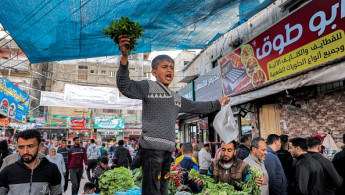This Ramadan, Gaza's families struggle to eat as food prices soar for a second month in a row
For the second month in a row, Gaza markets are witnessing what many are calling "an unprecedented rise" in the prices of food, particularly poultry, which in turn has forced low-income families in Gaza ability to diversify what they can eat as the Muslim holy month of Ramadan kicks off this year.
For the first time in over 15 years, the price of a kilogram of chicken meat reached $US 5, while the price of vegetables significantly increased to at least $US1 per kilogram.
"Because of this rise, I was not able to cook chicken for my children for the third consecutive day in the holy month of Ramadan," Halima al-Kafarneh, a woman from Beit Hanoun town in the northern Gaza Strip, told The New Arab.
"On the first day of Ramadan, I usually cook meat for my children, but this year I am unable to do so because of the greed of the merchants and the government's failure," the 45-year-old mother of seven said.
What made matters worse, she elaborated, was the rise of the prices of basic food commodities, including vegetables, cheese, and dairy.
"Unfortunately, I only bought the minimum amount of food for Ramadan... This prevents me from diversifying what I could cook for my children who fast more than 14 hours a day," al-Kafarneh said to The New Arab. "I don't know what I can cook for today."
Nasra al-Shawa, another woman from Gaza, is more fortunate than al-Kafarneh since she was able to get one piece of chicken for her family of five.
"I could not accept the idea that chicken would be absent from my table on the first day, but I was not able to buy more than one piece because of its high price," the 36-year-old told The New Arab while preparing vegetable soup for her family.
"Day by day," she added, "the situation in the Gaza Strip is getting worse due to the deteriorating economic conditions caused by the Israeli blockade, as well as the greed of merchants…Mostly, we (poor families) are victims of these successive crises in our region."
According to the Euro-Mediterranean Human Rights Monitor, about 1.5 million Gazans have become impoverished due to the Israeli siege.
In 2006, Israel imposed a blockade on the coastal enclave after Hamas, a Palestinian Islamist group, won a general election in the territory. Their electoral success resulted in clashes with rivals from Fatah, the movement that runs the Palestinian Authority (PA).
Israel further tightened its blockade against Gaza after Hamas forcibly took over the territory from Fatah in 2007.
Moreover, the United Nations Relief and Works Agency for Palestine Refugees (UNRWA) estimated that 80% of the Gazans, the majority of whom are refugees, are facing major food insecurity and depend on aid and handouts to survive.
Hamas blames rising food prices in Gaza on global trend after complaints from Palestinians in the besieged coastal enclave 👇https://t.co/myDfF1a1jp
— The New Arab (@The_NewArab) October 26, 2021
Adham Al-Basiouny, an official spokesperson for the Hamas-run Ministry of Agriculture in Gaza, attributed the rise in the prices of food and meat to the fallout of the Russian-Ukrainian war on global food prices.
The spokesperson further told The New Arab that the rise in the price of poultry was due to the scarcity of fertilized eggs, as a result of bird flu infestation in countries, including Israel, that supply fertilized eggs two months ago.
"The ministry is trying to increase the quantity of supply to limit the price hike," Al-Basiouny said. "But if prices rise globally, this will impact all products in Gaza."
Al-Basiouny shrugged aside complaints raised by Gazans about the existence of a monopoly by merchants that played a role in the rise of prices.
"The ministry is monitoring and follow-up of the markets, but the supply and demand process remains the main determinant in the Strip," he said.
In an attempt to provide an integrated food basket for poor families, Mohammed Al-Helou from Gaza City, along with a group of young people, launched the "Al-Khair" initiative to collect donations from higher-income families to buy basic foodstuffs for those in need.
"We are going through a very critical stage, the number of poorer-income families is doubling, while financial and food aid is shrinking. Everyone must assume his responsibilities towards these families in our society," Al-Helou said to The New Arab.
Al-Helou and his companions are hoping to provide around 200 food parcels that include meat, vegetables, and other supplies.





 Follow the Middle East's top stories in English at The New Arab on Google News
Follow the Middle East's top stories in English at The New Arab on Google News
![Netanyahu furiously denounced the ICC [Getty]](/sites/default/files/styles/image_330x185/public/2024-11/GettyImages-2169352575.jpg?h=199d8c1f&itok=-vRiruf5)
![Both Hamas and the Palestinian Authority welcomed the ICC arrest warrants [Getty]](/sites/default/files/styles/image_330x185/public/2024-11/GettyImages-2178351173.jpg?h=199d8c1f&itok=TV858iVg)
